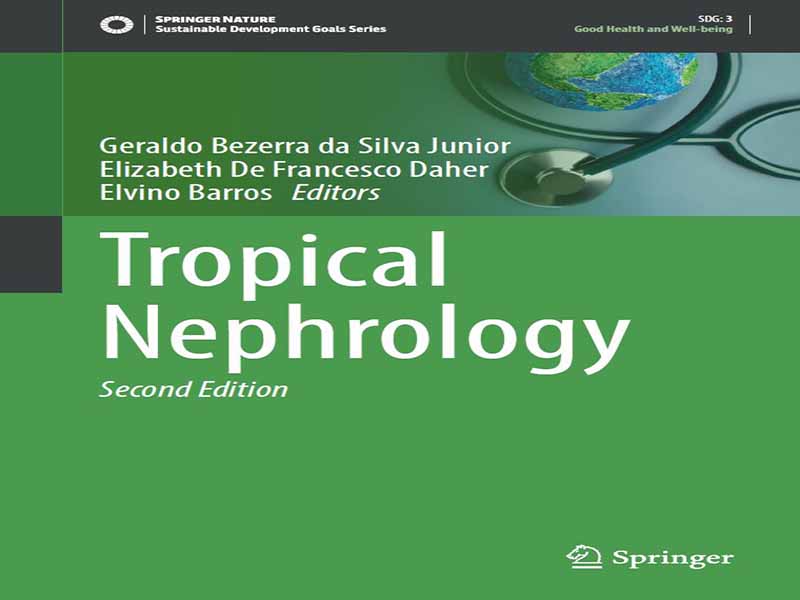- عنوان کتاب: Tropical Nephrology
- نویسنده: Geraldo Bezerra da Silva Junior
- حوزه: نفرولوژی
- سال انتشار: 2025
- تعداد صفحه: 404
- زبان اصلی: انگلیسی
- نوع فایل: pdf
- حجم فایل: 7.71 مگابایت
با کمال افتخار، پنج سال پس از انتشار اولین ویرایش این اثر، دعوت به نوشتن مقدمه برای ویرایش دوم کتاب نفرولوژی گرمسیری را پذیرفتم، که منبعی ضروری برای محققان و متخصصانی است که در این حوزه مهم از سلامت انسان فعالیت میکنند. این ویرایش شامل فصلهای جدیدی است که به موضوعاتی مانند تغییرات اقلیمی، استفاده از گیاهان دارویی، بیماری هاف و بیماریهای گرمسیری در بیماران پیوندی و همچنین بهروزرسانی فصلهای ویرایش قبلی میپردازد. این ویرایش بر اهمیت ارتباط بین بیماریهای گرمسیری – مانند مالاریا، شیستوزومیازیس، لپتوسپیروز و لیشمانیوز که در آب و هوای گرم شایع هستند – و تأثیر آنها بر سلامت کلیه، که توسط عوامل بهداشتی، محیطی و اجتماعی-اقتصادی پیچیدهتر میشود، تأکید میکند. نفرولوژی و پزشکی گرمسیری، اگرچه تخصصهای پزشکی متمایزی هستند، اما ذاتاً در مورد مراقبتهای بهداشتی برای جمعیتها، به ویژه افرادی که در شرایط آسیبپذیر اجتماعی قرار دارند، مرتبط هستند. هر دو در زمینههایی که مسائل اجتماعی-اقتصادی و محیطی خطر بیماری را افزایش میدهند و وضعیت افراد را در موقعیتهای پرخطر تشدید میکنند، بسیار مرتبط هستند. درک رابطه بین این حوزهها برای توسعه رویکردهای پزشکی و سیاستهای بهداشت عمومی با هدف بهبود شرایط زندگی و ارائه درمان مناسب برای این جمعیتها حیاتی است. روبم آلوز در مورد نقش بیماریهای مزمن اظهار داشت: «بیماری یک عملکرد آغازین دارد: از طریق آن میتوانیم به درک بهتری از خودمان برسیم.» خودشناسی، آگاهی از محیط اطراف و روشهای پیشگیری و مدیریت مؤثر، ابزارهای لازم برای کنترل تشدید شرایط نامطلوب و فراهم کردن کیفیت بهتر زندگی هستند. موضوع اصلی تحقیق گردآوریشده در اینجا، عوامل متعددی را برجسته میکند که میتوانند شیوع بالای این مسئله را در این منطقه از کره زمین توضیح دهند، حتی اگر این موضوع باید یک سابقه تاریخی از یک بلای گذشته باشد. به عنوان مثال، لپتوسپیروز باعث آسیب معمول به بافتهای کلیه میشود که میتواند منجر به آسیب کلیه شود. مالاریا نیز تفاوتی ندارد. همچنین میتوانم به گلومرولونفریت – یکی از پیامدهای شیستوزومیازیس – اشاره کنم. استفاده بیش از حد از داروهای نفروتوکسیک که برای مبارزه با بیماریهای خاصی که عملکرد کلیه را به طور جدی مختل میکنند، استفاده میشود. کمآبی ناشی از عدم دسترسی به آب آشامیدنی با کیفیت. مشکلات اضافه وزن ناشی از تغذیه ناکافی و عدم ورزش بدنی، که همه آنها قابل توجه هستند. یادآوری این نکته مهم است که سرعت تغییرات اقلیمی در برخی از نقاط کره زمین، عدم دسترسی به سیاستهای جدی آموزش سلامت و نابرابریهای اقتصادی، همانطور که در گزارش تغییرات اقلیمی و سلامت سازمان بهداشت جهانی در سال 2021 ذکر شده است، میزان نگرانکننده بیماری، به ویژه در پزشکی کلیه را توضیح میدهد. سر پاتریک منسون، پزشک و محقق اسکاتلندی قرن نوزدهم، که به خاطر مشارکتهای پیشگامانهاش در پزشکی گرمسیری، به ویژه در مطالعه بیماریهای انگلی و درک نقش ناقلین در انتقال بیماری شناخته میشود، پزشکی گرمسیری را نه صرفاً به عنوان وسیلهای برای درمان، بلکه به عنوان راهی برای درک و احترام به این روابط پیچیده میدید. سورنسن (2020)، محقق برجسته در این زمینه، اظهار میکند که “سلامت انسان عمیقاً با سلامت سیاره ما مرتبط است و حفاظت از هر دو یک اولویت فوری است.” بنابراین، فراتر از توصیف موارد مشاهده شده، این اثر همچنین فراخوانی برای اتخاذ روشهایی است که نه تنها به مدیریت علائم میپردازد، بلکه آگاهی مقامات، جامعه مدنی، مطبوعات و متخصصان بهداشت را در مورد اتخاذ سیاستهای اقلیمی که لزوماً شامل آموزش بیشتر بهداشت عمومی است، افزایش میدهد. دادههای بهروز شده از سازمان بهداشت جهانی (WHO) نشان میدهد که در سراسر جهان، حدود ۲ میلیارد نفر به طور منظم به آب آشامیدنی سالم دسترسی ندارند. رژیمهای غذایی سرشار از سدیم و کممواد مغذی – که بیشتر در دسترس افراد کمدرآمد است – همچنین خطر فشار خون بالا و دیابت را افزایش میدهد، که همانطور که میدانیم، دروازههایی برای بیماریهای نفرولوژیک هستند و اغلب مورد غفلت قرار میگیرند، همانطور که بیماریهای گرمسیری در کشورهای در حال توسعه نیز چنین هستند. با توجه به نیاز به اطلاعات باکیفیت در این نبرد بیپایان، به هر محققی که با دقت و فداکاری، این مجموعه مطالعات را که این کتاب را تشکیل میدهد، ارائه میدهد، تبریک میگویم. باشد که آنها در زمینه علم و تحقیق که همانطور که میدانیم، قدرت بهبود زندگی این نسل و ایجاد جهانی کمتر خصمانه و سالمتر برای نسلهای آینده را دارد، موفق باشند.
It is with great honor that, five years after the release of the first edition of this work, I accepted the invitation to write the preface for the second edition of Tropical Nephrology, an essential resource for researchers and professionals working in this important area of human health. This edition includes new chapters addressing topics such as climate change, the use of medicinal herbs, Haff disease, and tropical diseases in transplant patients, as well as updates to the chapters from the previous edition. It reinforces the importance of the association between tropical diseases— like malaria, schistosomiasis, leptospirosis, and leishmaniasis, which are prevalent in warm climates—and their impact on kidney health, further complicated by sanitary, environmental, and socioeconomic factors. Nephrology and tropical medicine, though distinct medical specialties, are intrinsically linked when it comes to healthcare for populations, particularly those in socially vulnerable conditions. Both are critically relevant in contexts where socioeconomic and environmental issues heighten disease risk, exacerbating the plight of individuals in precarious situations. Understanding the relationship between these areas is vital for developing medical approaches and public health policies aimed at improving living conditions and providing appropriate treatment for these populations. “Disease has an initiatory function: through it, we can come to a greater understanding of ourselves,” reflected Rubem Alves on the role of chronic illness. Self-knowledge, an awareness of one’s surroundings, and effective prevention and management methods are the necessary tools to control the aggravation of undesirable conditions and to enable a better quality of life. The guiding theme of the research compiled here highlights the multitude of factors that can explain the high prevalence of this issue in this region of the planet, even though it should be a historical record of a bygone scourge. For instance, leptospirosis causes typical damage to kidney tissues, which can lead to kidney injury. Malaria is no different. I could also mention glomerulonephritis—one of the consequences of schistosomiasis; the excessive use of nephrotoxic drugs used to combat certain diseases that seriously impair kidney function; dehydration caused by lack of access to quality drinking water; overweight issues due to inadequate nutrition and lack of physical exercise, all of which are significant. It is important to remember that the rapidity of climate change in some parts of the planet, the lack of access to serious health education policies, and the economic disparities, as noted in the 2021 WHO Climate Change and Health Report, explain the alarming rates of illness, particularly in kidney medicine. Sir Patrick Manson, a nineteenth-century Scottish physician and researcher, known for his pioneering contributions to tropical medicine, especially in studying parasitic diseases and understanding the role of vectors in disease transmission, viewed tropical medicine not merely as a means of healing but as a way to understand and respect these complex relationships. Sorensen (2020), a prominent researcher in the field, states that “human health is deeply connected to the health of our planet, and protecting both is an urgent priority.” Therefore, beyond describing the cases observed, this work is also a call for the adoption of methods that not only address symptom management but also raise awareness among authorities, civil society, the press, and health professionals about adopting climate policies that necessarily involve greater public health education. Updated data from the World Health Organization (WHO) shows that around the world, about 2 billion people lack regular access to safe drinking water. Diets high in sodium and low in nutrients—more accessible to lowerincome individuals—also increase the risk of hypertension and diabetes, which, as is known, are gateways to nephrological diseases and are often neglected, as are tropical diseases in developing countries. In light of the need for quality information in this unending battle, I congratulate every researcher who, with care and dedication, brings to light this collection of studies that comprise this book. May they be prosperous, advancing in the field of science and research, which, as we know, has the power to improve the lives of this generation and leave future generations a less hostile and healthier world.
این کتاب را میتوانید بصورت رایگان از لینک زیر دانلود نمایید.
Download: Tropical Nephrology





































نظرات کاربران